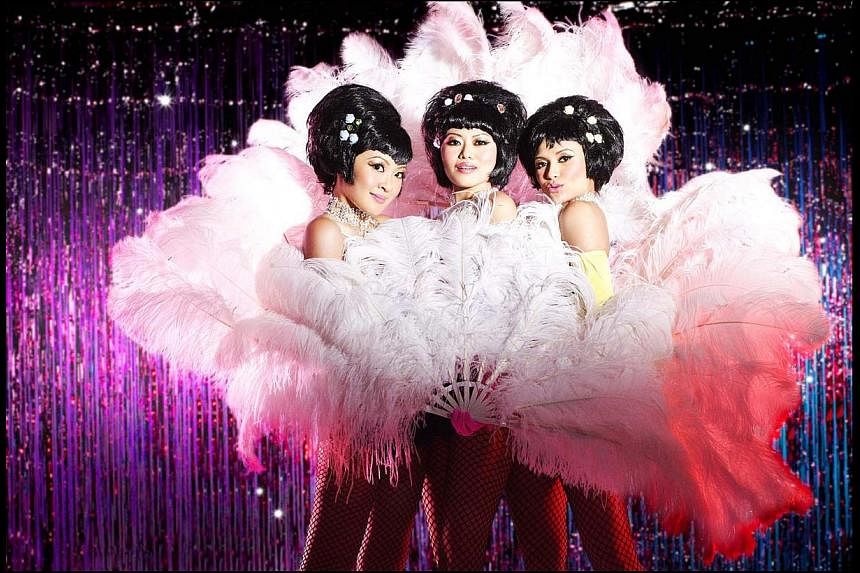Play: Beauty World (1988)
Playwright: Michael Chiang, with lyrics and music by Dick Lee
What it is about: Ivy Chan, a small-town girl from Malaysia, travels to Singapore in search of her long-lost father. The only clue she has is a jade pendant bearing the words Beauty World - which turns out to be a seedy cabaret brimming with quirky characters and headlined by the va-va-voom cabaret girl Lulu. Ivy joins the cabaret undercover to find out more about her past. Mistaken identities, soulful ballads and cheeky cha-chas ensue.
While Beauty World was not the first musical to glide across the Singapore stage, it left something in its glittery, feathery wake that hit the sweet spot between nostalgia and sentimentality, between campy entertainment and great warmth and tenderness.
In a time when Singapore was not yet on the Broadway musical touring circuit, Beauty World was a musical extravaganza that was "better than the West End", as original lead Claire Wong puts it - because it was Singapore's very own.
From those familiar syncopated rhythms of the title song to the charming melodrama that borrowed from black- and-white Hong Kong movies, Beauty World moved from its first performances on the World Trade Centre stage at the 1988 Singapore Arts Festival - to everyone's living rooms when it was staged as part of the President's Star Charity show in 1998.
That iconic 10th anniversary revival on TV, starring screen personalities such as Sharon Au, Evelyn Tan and Jack Neo, cemented Beauty World in the public consciousness as a beloved early musical in Singapore theatre history.
Together with Chiang's previous hit, the army comedy Army Daze, Singapore theatre was becoming increasingly mainstream as audiences grew accustomed to seeing versions of themselves on stage. The shows had their detractors, but there was no doubt that they were bringing new audiences to the theatre.
Theatre practitioner and educator T. Sasitharan wrote in The Straits Times in December 1990 that while Army Daze and Beauty World were "soulless and commercial", they have played a "pivotal role" in drawing a new generation of theatregoers.
Beauty World marked the first collaboration between playwright and media consultant Chiang and musician and composer Lee, an inspired partnership by any measure. Both artists have a keen sense of what an audience wants to see and hear.
Speaking to Life! together over tea, Lee, 58, and Chiang, also 58, share an easy chemistry, finishing each other's sentences as they recount their creation of the musical.
Lee had written the Beauty World (Cha-Cha-Cha) theme song prior to the first stirrings of the musical, which had emerged from a long-time fascination with Beauty World - "an obsession!", Chiang interjects.
Lee had grown up near Beauty World amusement park in Bukit Timah, then a maze of stalls where he would hear strains of the popular music at the time, from singers Rita Chao to Sakura Teng.
Architect Justin Hill, who was on TheatreWorks' board of directors, recommended that Lee work with Chiang, who was then working at The Straits Times, just down the road from where Lee was living, in Kim Seng Road.
"After work, I'd go over and then we'd talk," Chiang says with a grin, and Lee continues: "I just gave him an idea that it was about a cabaret, and we sort of hammered out the storyline, and he worked out the synopsis."
Chiang adds: "I loved musicals, and I had seen many of them, so I kind of knew that the story arc had to be something like this, but the interesting thing for me was infusing it with the childhood images I had."
He was deeply inspired by the sensational Cantonese melodramas in which everything was black and white in the metaphorical sense - characters were either very innocent or very wicked, with nothing in between.
The duo plotted where the songs should go in the musical, then went off to write their own portions before returning to discuss how to stitch the work together.
Chiang says: "Sometimes he had a song idea first, he'd say, 'okay, I want a song like this, a fun song, you find some way to phrase it'. And I'd think about it and go, 'okay, I know how to do it'."
The musical unfolded in this organic fashion, with the two creators bouncing ideas off each other and fleshing out sections in pieces over about four to five months.
It went into rehearsal in January 1988. Beauty World paved the way for future home-grown musicals, such as the blockbuster Chang & Eng by Action Theatre in 1997.
It also introduced a host of theatre practitioners who have come to hold the reins of the contemporary scene today: director Ong Keng Sen, 51, in his final year of law school, helmed the production; he cast Wong, 49, also then in law school, as Ivy Chan - she is now co-artistic director of Checkpoint Theatre.
In the lead cast were Ivan Heng, artistic director of Wild Rice, singer and actress Jacintha Abisheganaden, and a host of other practitioners who are all familiar names today, including Lim Kay Siu, Margaret Chan, Tan Kheng Hua, Jeremiah Choy, Noorlinah Mohamed, Eleanor Wong and Koh Chieng Mun - a power-packed ensemble.
What Wong remembers most about her professional stage debut was the sheer joy and panic that came in those early days, when the technical side of Singapore theatre was still playing catch-up.
The World Trade Centre stage, for instance, was more equipped for seminars than a full-blown musical and during one of the first few performances, the sound died halfway through a scene.
Wong, who was on stage with Abisheganaden, ad-libbed a conversation with her for five long, painful minutes. The audience erupted into applause and cheers when they realised that the actresses had been improvising, and the two ended up serving Kickapoo and curry puffs from Polar Cafe to those seated in the first few rows.
Wong says with a laugh: "The audience couldn't believe it... they were just so delighted that they were 'in it' with us. It was one of those magical, unplanned, behind-the-scenes moments that the audience got to experience."
Ong says that he tried to avoid drawing too much from the Western musical: "The Broadway razzmatazz was something I had to fight against, because I had to find some sort of local emotional resonance...."
He recalls how they visited "dodgy" night clubs as part of research: "I was a fish out of water. We would buy drinks and sit - it was just so dark that we couldn't see each other, the floor was slimy, the leather cushions were sticky. It was really a different culture. We were dealing with the dying Chinese nightclub scene before the karaoke pubs came onto the scene."
Previous iterations of Beauty World have mostly glossed over that underbelly, but in its next revival, which will take place in November next year at the Victoria Theatre, Lee and Chiang say the show will be a "darker" one.
Lee, who will be directing, emphasises that cabarets were indeed "scary places" in the past. But at the same time, Beauty World was also "a musical of recognition and celebration", as Ong puts it.
Singapore was also discovering that the arts could, in fact, be commercially viable, and that it could export its artistic talent. Beauty World went on to do a successful tour of Japan in 1992.
Lee adds: "Beauty World is significant for me in terms of my search for a Singapore identity... We were coming closer to doing something Singaporean and not being ashamed of it."
Play Things: The Complete Works 1984-2014 by Michael Chiang, which includes Beauty World, is available from Books Kinokuniya at $39.94.
The next instalment of this 15-part series will be published at the end of next month.




